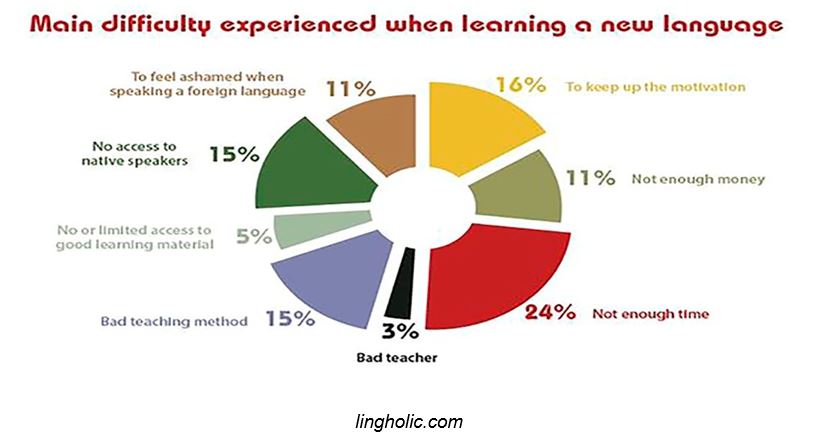ALS
25 July 2016
10 Reasons To Learn Chinese Using Songs
Language learners’ knowledge of strategy for language learning directly affects their language performance. The chart below shows that the biggest challenge when learning a new language is not having enough time. Using songs as a support to learn Chinese is ideal because it does not take much time to listen to a song. The activity can be repeated easily many times a day or incorporated into learner’s daily routine. Study shows that there is a positive correlation between language learners’ exposure to music and their language achievement.
The second biggest challenge is keeping up the motivation. Chinese language is grouped as one of the most difficult languages for English speakers to learn because the two languages are very different. It is easy to lose motivation when a target language is perceived to be too difficult to master. Being able to access fun learning materials increases language learners’ motivation and fuel their interest to learn more about the target language. Listening to music is an enjoyable activity for most people. Injecting entertainment into language learning will increase learner’s enjoyment and people want to keep doing what is enjoyable.
The next challenge is having no access to native speakers. When learners learn the target language in an English speaking environment, listening to target language songs is a good way to receive native speaker’s input and hone pronunciation and listening skills. It creates more chances for learners to be surrounded by the target language outside of their Chinese classes. One problem language learners faces when it comes to listening comprehension is not being able to recognise the words they learn from texts when spoken. Songs provide a channel for language learners to hear how words are pronounced in different contexts by different people.
Most language learner’s oral practice occurs in the classroom. Most people do not practice speaking outside the classroom. Thus, listening to a song and singing along encourages learners to practice the target language orally outside classroom hours. The more oral participation, the better learner’s language development is.
Here are the 10 benefits of using songs to learn Chinese:
1. Learn new vocabularies
It is not enough to rely on textbook to acquire new vocabularies. Playing songs is a good channel to enable incidental vocabulary gain on many topics. Watching music videos with subtitles also increases incidental vocabulary learning.
2. Result in better memorisation
People will remember new words especially quick if the words are of interest, appear in a memorable context, or appear frequently. This is when songs are especially useful. Songs usually repeat certain phrases over and over, which makes them memorable through excessive exposure. Memorable tunes also support the learning process.
3. Can lead to long term retention
The use of music has been shown to enhance the learning process. As music is processed by the right hemisphere of the brain and language is processed by the left hemisphere of the brain, the use of both hemispheres during the process somehow results in better long-term retention.
4. Assist with pronunciation
Learn from native speakers how to pronounce the words. This is especially useful when language learners’ environment lacks exposure to the native speakers. Singers tend to pronounce the lyrics clearly so songs can be a good source to practice listening comprehension and pronunciation.
5. Minimum investment of time
Listening to a song takes only 2 to 3 minutes. It can be replayed many times. The repetition acts as a reinforcement for the memorisation process.
6. Learn cultural values of the target language
Lyrics impart how a culture expresses their feelings and thoughts. Music videos may give viewers further cues on the society and cultural trends of the target language.
7. Easily learn ready-made expressions that can be practical for everyday speech
Lyrics are usually formatted into easy to sing phrases and these phrases can be quite handy for daily conversation. Some songs may contain lyrics that are more poetic and thus are not suitable for daily conversation. Choose your songs carefully!
8. Learn to speak in whole sentences
Study shows that the beat in pop music helps language learners create a sense of inner timing and speak in fluency instead of one word at a time.
9. Relaxing and fun
Music can induce relaxation. People learn better when they are relaxed. With so many genres of songs available today, learners can choose the types of songs that suit them. For beginner learners, it is best to choose songs with simple lyrics that are sung relatively slow.
10. Increase learner’s motivation, enjoyment, and confidence
Practice makes perfect! All three are interlinked. Using songs to support the learning process can be motivating, which in turns increases learner’s enjoyment. When learners practice more, their listening and pronunciation skills are improved, their vocabulary knowledge increases, and their language proficiency improves.
We have selected the songs below to get you start practicing Chinese through songs or music videos with subtitles. The lyrics are relatively simple, the pronunciation is clear, and they are also popular.
Last but not least are Teresa Teng’s classic songs which are excellent for beginner Chinese learners. Her most famous song 月亮代表我的心 has been covered by many artists, including Bon Jovi.
See also How To Learn Chinese By Watching Chinese Movies.
Click the button below to learn more about our online Chinese classes for adults (general, business, travel, or HSK preparation).










